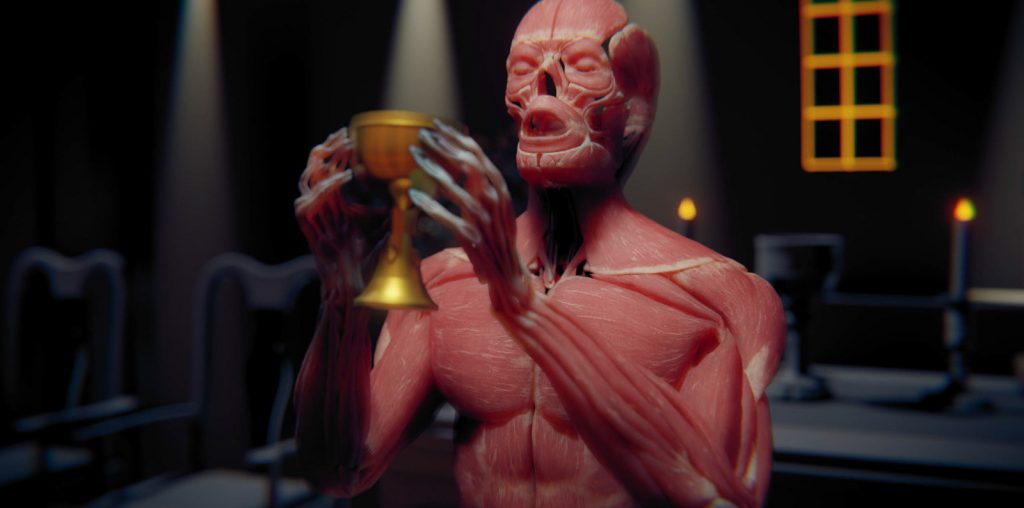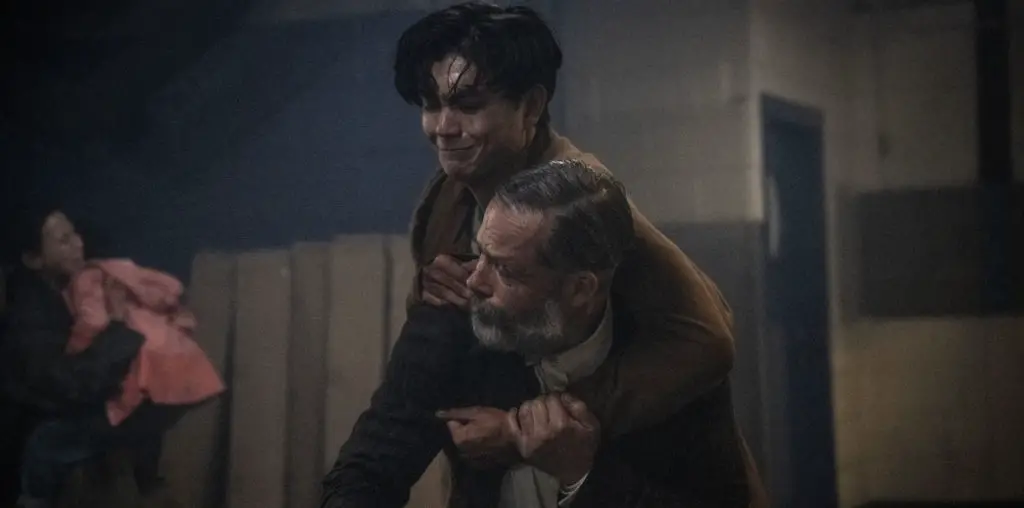
“The Death of Mr. Lazarescu” is as cruel and unsentimental as the discovery of a cancerous lump. Romanian director Cristi Puiu has acid-washed her film of any televised gloss: if you find “E.R.” and “House” tough to take, don’t bother embarking on this rough, glamour-free ambulance ride. But if you love adventurous cinema, Puiu’s transcendent, unique foray into the culture of health care is a must-see.
Wearing a knit cap and striped shirt, Dante Lazarescu (Ion Fiscuteanu) resembles a Devil’s Island prisoner from “Papillon.” And in a sense, he is imprisoned – in a tiny apartment shared with two cats. The raucous sound of television pulsates through thin walls. In the kitchen, bacteria-soaked brillo pads peek from a sink-side cup. Dirty dishes clutter limited counter space. Dante appears a bit cluttered himself, in need of a shave and sporting the untamed eyebrows of Andy Rooney or Ernest Borgnine. He chugs Mastropol, a wicked style of hooch made from double-strength alcohol and vanilla.
Dante is a thoroughly unremarkable man in a thoroughly unremarkable situation. Yet, through subtle gestures and comments, his humanity is easily recognizable. “Just f*****g shut,” he instructs a stubborn closet door. We hear a ringing telephone. Although Dante sits beside the device, he waits a couple more rings before answering the call. We’ve all done this. Why? Does allowing three rings summon forth some kind of magical guarantee that the ensuing conversation will be more pleasant? Does it make us seem less pathetic and more in demand? These amusing details offset the film’s ultra-real grimness.
“The Death of Mr. Lazarescu” doesn’t remain in the apartment. Dante endures a worsening headache, before puking into his slippers. “This is not good,” suggests a concerned neighbor. An ambulance is summoned.
Mioara (Luminta Gheorghiu), a redheaded nurse donning an orange vest labeled “ASISTENT,” arrives on the scene. After providing Dante with a brief checkup, Mioara whisks him away in an ambulance. The vehicle’s driver is condescending, calling Dante “Pops.”
The ambulance pulls into a hospital parking lot. Reclining on a gurney, Dante is wheeled into an emergency room. We immediately sense that this is a poor night to seek hospital attention. Nurses, doctors, and paramedics speak in panicked tones about a devastating bus accident that has killed several people. “Doctor, my head hurts,” Dante informs. “Good,” exclaims the examining physician. “It means you have one!”
The doctor blames Dante’s condition on his drinking. “Did I put the bottle in your hand, you pig?” The compassion-challenged caregiver then summons a nurse, ordering, “Get him out of my sight.”
And so it goes.
“The Death of Mr. Lazarescu” grows into a brilliant tragicomedy, as Mioara is forced to accompany Dante through an all-night tour of hospitals, specialists, and conflicting evaluations. Neurologists test for stroke and hematoma. Tomography experts facilitate a CAT scan. Surgeons argue over consent forms. In a sense, the film resembles Martin Scorsese’s “After Hours,” in its darkly comic look at a humble everyman’s rapidly deteriorating evening of hellish misfires and setbacks. But visually, it suggests the less stylized, more matter-of-fact approach of Mike Leigh.
Aiding in the film’s “here and now” effect is sensational acting across the board. How did Puiu establish this utterly convincing urban ant colony? Each specialist is equipped with his or her own very specific collection of tics, mannerisms, and speech patterns. Female doctors flirt with male counterparts. Nurses share astrology signs.
Anyone affiliated with health care will no doubt recognize these truths, many of which are not honorable. When Mioara finally succeeds in acquiring Dante the attention of a surgery department, the doctor’s callous arrogance is horrifying. And his attitude is echoed by nearby nurses, suggesting a staff elitism that has long since infected everyone on board. “We’re all medical staff here,” states Mioara, arguing that Dante needs to be seen immediately. “No,” corrects the surgeon, offended by her persistence. “We’re all medical staff with different degrees.” One of the film’s running jokes concerns health care workers constantly excusing themselves for cigarette breaks. Ever worked in a hospital? It’s true – ciggies are an omnipresent, ironic sight at these life-saving facilities.
“The Death of Mr. Lazarescu” is funny, infuriating, and heartbreaking. But it’s not an easy watch. In fact, the question might rightfully be asked, “Why watch a film about the deterioration of an old man’s health over the course of one long, complicated evening?” One answer might be to marvel at how a movie can capture the entire holistic arc of a subculture, where both staggering egotism and selfless nurturing exist hand-in-hand. In both embracing and denouncing our culture of medicine, “The Death of Mr. Lazarescu” reveals the awesome, complex, and mysterious interplay between dozens of people involved in the care of one individual. It’s a film like no other.

